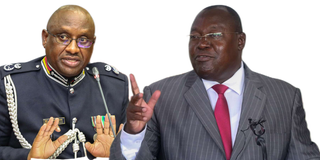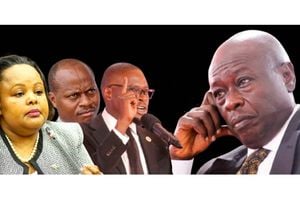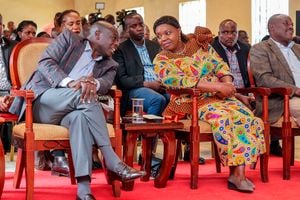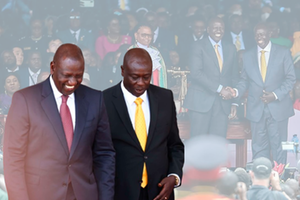Officers side with NPSC on IG Japhet Koome police promotions

Inspector-General of Police Japhet Koome (left) and National Police Service Commission Chairman Eliud Kinuthia.
The controversial promotion of over 500 senior police officers by Inspector-General of Police Japhet Koome last week has split the service down the middle, with insiders now linking the stalemate to political alignments within and outside the service.
On Monday last week, Mr Koome announced through a memo that he had promoted 514 senior officers. But the move was declared illegal and unprocedural by the National Police Service Commission (NPSC), which said the positions were not advertised beforehand.
Later in the week, the commission advertised for the same positions, a move that angered Mr Koome, who then circulated a memo ordering officers to ignore the advertisement or face disciplinary action.
The standoff has divided the service, with those affected now appealing to the President to intervene, saying they have missed out on being promoted after the IG allegedly made promotions that were largely skewed towards two communities and cronies and relatives of senior officers.
A number of those promoted agree that the correct procedure was not followed—some of them had not completed the mandatory three-year stay in one rank before being promoted to the next, as per the service’s Standing Orders and Career Progression Guidelines.
“Some were promoted as early as February this year, hence the outcry because there are members who have stayed in the same rank for a long time without being promoted,” an officer told the Nation.
While many seem to agree that the Mr Koome’s move was arbitrary, questions have arisen as to where he is drawing powers to implement the directive, with officers now claiming he has the backing of a higher office.
The IG has cited Article 245(4)(c) of the constitution, which states that no person shall direct the Inspector-General with respect to the employment, assignment, promotion, suspension or dismissal of any member of the National Police Service (NPS).
However, the law also states that where promotions are delegated to the IG, the NPSC must be notified in writing and the process must follow the guidelines laid down by the commission, which has the power to revoke them if the rules are not followed.
“The basis for all promotions shall be in accordance with the standards relating to the job descriptions and specifications for all civilian and uniformed police positions as approved by the Commission,” NPSC’s regulations on promotions state. The rule was in place during the regimes of previous IGs, from David Kimaiyo to Hilary Mutyambai.
“Based on the above irregularities, among others, the commission hereby issues the following directives; all purported promotions conferred on selected members of the NPS on June 5, 2023 are declared irregular and unprocedural. Any officer using such rank as irregularly conferred is warned that all benefits derived will attract personal liability,” NPSC chief executive Peter Leley said last week.
In a September 2013 judgement, Justice George Odunga ruled that the powers to determine promotions and transfers within NPS were vested in the commission and that any regulation purporting to take away those powers and vest them in another body would be inconsistent with the constitution.
“Before concluding this judgment, it is important that both the Inspector-General of Police and the commissioners of the National Police Service Commission work together for the good of this nation. They must remember that under Article 129(2) of the Constitution, “executive power shall be exercised in a manner consistent with the principle of service to the people of Kenya and for their welfare and benefit”.
“If the two offices do not exercise their powers in a manner consistent with the principle of service to the people of Kenya and for their welfare and benefit, they may be acting in contravention of the Constitution. It is therefore hoped that sobriety will prevail among the said authorities and that they will avoid political expediency, popularity gimmicks, chest-thumping or competitive streaks that this country has been subjected to in the recent past,” Justice Odunga said.
The IG is part of the nine-member commission that sits and decides on promotions, welfare and other personnel matters, but Mr Koome has made it clear that he prefers the commission be headed by the IG rather than a civilian.
In his submission of the NPS’s recommendations to the Taskforce on Police and Prison Reforms, the IG likened the commission to the Judicial Service Commission and the Parliamentary Service Commission, which are chaired by the Chief Justice and the Speaker, respectively.
“What he failed to understand is that the Judiciary and Parliament are arms of government and the NPS is not,” explained a senior officer.
The commission is currently made up of four civilians: Chairman Eliud Kinuthia, Vice-Chair Alice Otwala, Mr Leley, James Ole Moyaki and Mr Edwin Cheluget. It also has five police officers: Mr Koome, Deputy IG-Administration Police Service Noor Gabow, Deputy IG-Kenya Police Service Douglas Kanja and two retired police officers, Eusebius Laibuta and Lilian Kiamba.
Matters relating to welfare, promotions and transfers remain a sensitive issue, with a majority of officers in the lower ranks feeling oppressed. In some cases, they have had to take legal action against the IG and NPSC following the reduction of their salaries and arbitrary transfers.
The commission has been accused of fighting to assert its authority a little too late.
“It should have put its house in order and stamped its authority when cracks appeared following the illegal downgrading of the ranks of graduate constables. At the time, it played the role of the oppressor, tied to the hip of the former IG. But on this issue, it is doing the right thing, but a little too late when officers have lost confidence in it,” a member of the Professional Criminologists Association of Kenya, which mainly comprises of officers and detectives, told the Nation.
How long the impasse lasts now depends on the actions of President William Ruto, with sources suggesting that he may not be aware of the decision by the IG and his deputies to promote officers without consulting NPSC.
Meanwhile, the push and pull between the NPS leadership and the commission continues, with both reportedly enjoying the support of different senior government officials. The same political interests have stalled the prosecution of thieves who stole from former President Uhuru Kenyatta’s family farm.





